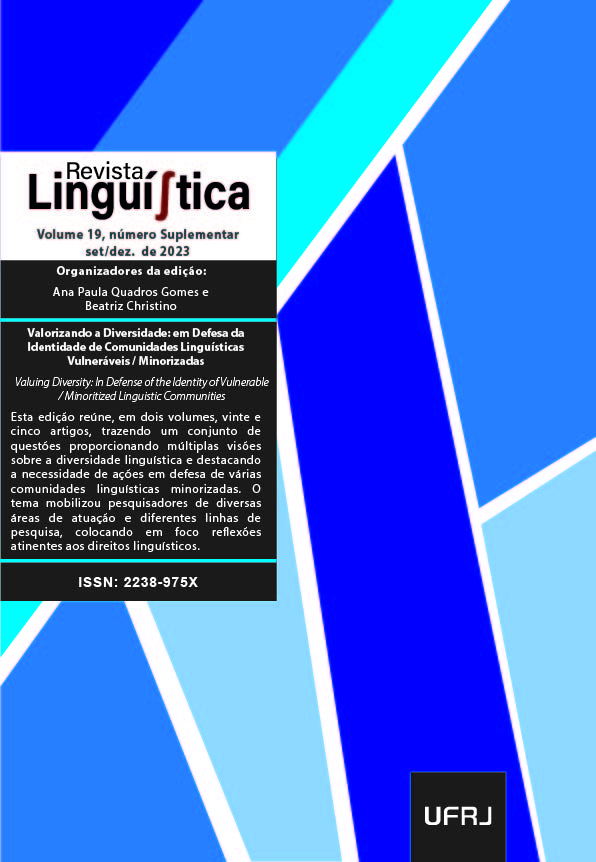Identities in dialogical movement: deafness in social context
DOI:
https://doi.org/10.31513/linguistica.2023.v19nSup.a60315Keywords:
Linguagem, Identidade, Surdo.Abstract
The objective of this study is to verify if and how the actions of verbal ideological, centripetal, and centrifugal forces, linked to deafness in the social context, reflect deaf people and their hearing mothers’ identity positions, all learners of Libras (Brazilian Language of Signs) at CAS Natal. Language is a main force moved by heterogeneous discourses which happen in different modalities, visual or oral, and which are faced as we cross different socio ideological relations, reflecting this way, identity positions. Thus, our investigative eyesight is situated within the area of indisciplinary Applied Linguistics (Moita-Lopes, 2006, 2013; Kleiman, 2013), that brings to the stage the voice of socially marginalized subjects. The concept of language considered as a social practice by the Bakhtin Circle (Bakhtin, 2011, 2015; Volóchinov, 2018, 2019) leads us to the comprehension of the action of forces which create ideological tensions able to subside identity constitutions. The discussion on identities is based on the Cultural Studies (Hall, 2014, 2020; Woodward, 2014), and the discussion on Libras on Deaf Studies (Baleiro Lodi, 2021; Lodi, 2006; Sá, 2010; Skliar, 1998). The data of this qualitative interpretative research was taken from a Master dissertation by Lima (2022). Analyses indicate that verbal ideological forces do influence both deaf and listeners’ representations of deafness. We conclude that the action of the centripetal force is strongly attached to discourses about deafness, but also that the action of centrifugal forces strengthens the resignification of those discourses.
Downloads
Published
Issue
Section
License
Copyright (c) 2024 Revista Linguí∫tica

This work is licensed under a Creative Commons Attribution-NonCommercial 4.0 International License.
Authors who publish in the Revista Linguí∫tica agree with the following terms:
The authors maintain their rights, ceding to the journal the right to first publication of the article, simultaneously submitted to a Creative Commons license permitting the sharing with third-parties of published content as long as it mentions the author and its first publication in the Revista Linguí∫tica.
Authors may enter into additional agreements for the non-exclusive distribution of their published work (for example, posting in online institutional or non-profit repositories, or book chapters) so long as they acknowledge its initial publication in the Revista Linguí∫tica.

The journal Revista Linguí∫tica is published by the Post-Graduate program in Linguistics of UFRJ and employs a Creative Commons - Attribution-NonCommercial 4.0 International (CC-BY-NC).









